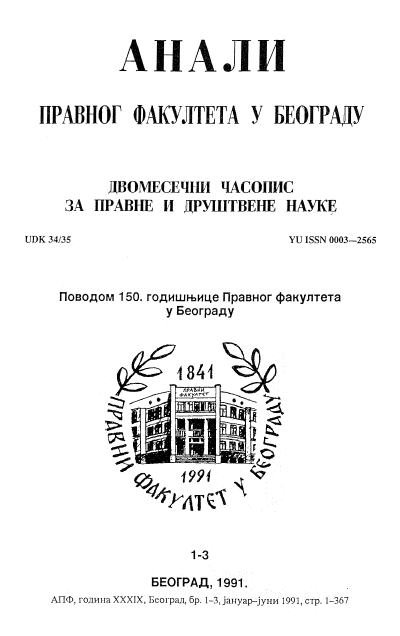НАУЧНО ИСТРАЖИВАЊЕ У ТЕРИТОРИЈАЛНОМ МОРУ У СВЕТЛОСТИ КОНВЕНЦИЈЕ О ПРАВУ МОРА ИЗ 1982. ГОДИНЕ
SCIENTIFIC RESEARCH IN TERRITORIAL WATERS AND THE CONVENTION ON THE LAW OF THE SEA OF 1982
Author(s): Milenko KrećaSubject(s): Maritime Law
Published by: Правни факултет Универзитета у Београду
Keywords: Territorial waters; Scientific research; Inoffensive passage
Summary/Abstract: According to the author the solution contained in article 245 of the Convention on the Law of the Sea of 1982 is based on two constitutive elements: (1) the right of scientific research in territorial waters is exclusively a right of the riverine state, and an expression of sovereignty it possesses over such space; and (2) scientific research of the sea in the above respect may be effected only after obtaining an express consent of me riverine state. Since the sovereign power of the riverine state over the territorial waters is subject to restrictions in terms of inoffensive passage of foreign ships, the issue arises as to whether this right consumes also the authority to make some research. The Geneva Convention on Territorial Sea and External Sea Belt (1958) does not directly answer the above question. The correct answer should be related to the reason behind the institute of inoffensive passage. „Order, peace and safety of the riverine state" are permitted limits of effecting the right of inoffensive passage which, in essence, is a concession to international navigation, as the external expression of the genuine need for international cooperation. The author therefor submits that a foreign ship, while sailing through territorial waters could effect only those measurements which are closely connected to functionning of safe navigation. The 1982 Convention is, however, constructed on expressly construed principle of the sovereign right of the riverine state to effect scientific research in its own territorial waters. Is it possible, due to the powers of the riverine atate established ba article 21 (1 ,g) of the Convention, to qualify the passage of a ship effecting research or measuring in the territorial waters as inoffensive - contrary to the provision of article 19 (2, j) of the Convention? According to the author this is not the case of inoffensive passage, but of scientific research in the territorial waters. In other words, the riverine state which does not use the powers from article 21 of the Convention renounces in the specific case only its subjective right to take permitted counter - measures, but it does not infringe upon the nature of such passage as being offensive according to international law.
Journal: Анали Правног факултета у Београду
- Issue Year: 39/1991
- Issue No: 1-3
- Page Range: 171-179
- Page Count: 9
- Language: Serbian

